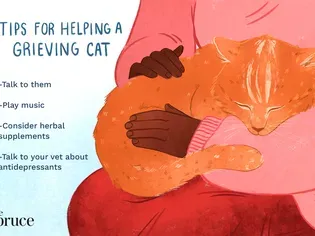Helping Cats' Cope Over Pet Loss
Updated on 04/26/24

How to Help Your Cat Cope with Pet Loss: A Compassionate Guide
Losing a beloved pet is a profound and heartbreaking experience for both humans and animals alike. For cats, who are social creatures with strong bonds to their companions, the loss of a furry friend can be particularly distressing.
As a loving pet parent, it's crucial to provide your cat with the support and care it needs during this sensitive time. Here's a comprehensive guide to help you navigate the grieving process and ensure your cat's well-being:
Understanding the Signs of Grief in Cats
Cats express grief differently than humans. Some common signs include:
* Behavior changes: Decreased appetite, increased sleeping, excessive meowing, or aloofness
* Physical symptoms: Weight loss, diarrhea, vomiting, or changes in grooming habits
* Vocalizations: Howling, wailing, or persistent meowing
* Repetitive behaviors: Pacing, staring into space, or excessive licking
Providing a Safe and Supportive Environment
* Create a quiet and comfortable space: Provide your cat with a cozy bed, a familiar blanket, and a place to hide if it feels overwhelmed.
* Maintain a consistent routine: Stick to your cat's regular feeding, playing, and grooming schedule as much as possible.
* Offer plenty of affection: Give your cat extra attention, gentle petting, and soothing cuddles.
Addressing Behavioral Issues
* Excessive meowing: Try calming music or pheromone diffusers to reduce anxiety and soothe your cat.
* Inappropriate elimination: If your cat starts urinating or defecating outside the litter box, consult with your veterinarian to rule out any medical issues.
* Self-destructive behaviors: If your cat is licking or chewing excessively, provide interactive toys or puzzle feeders to distract it.
Encouraging Physical and Mental Health
* Regular veterinary checkups: Your veterinarian can monitor your cat's overall health and rule out any underlying medical conditions.
* Healthy diet and exercise: Feed your cat a nutritious diet and encourage regular play to promote physical and mental well-being.
* Mental stimulation: Provide your cat with interactive toys, puzzle feeders, or cat trees to stimulate its cognitive abilities.
Examples of Supportive Strategies
* Create a memorial space: Dedicate a special spot in your home with photos or mementos of the departed pet.
* Use calming scents: Lavender or chamomile essential oils can help relax and soothe your cat.
* Consider a companion animal: Introducing a new companion, such as another cat or a dog, can provide your cat with companionship and emotional support.
Seeking Professional Help
If your cat's grieving process is severe or prolonged, don't hesitate to seek professional help from a veterinarian or animal behavioralist. They can provide additional support, prescribe medications if necessary, and help you develop a personalized plan for your cat's recovery.
Remember, every cat grieves differently. Be patient, understanding, and provide your beloved companion with the love, care, and support it needs during this challenging time. By following these compassionate strategies, you can help your cat cope with pet loss and guide it towards a path of healing and well-being.
Explore More Pets

Cat Behavior Problems
How to Stop Aggression in Kittens

Long-Haired Cat Breeds
Siberian Cat: Breed Profile, Characteristics, & Care

Cat Behavior Problems
How to Stop Kittens From Scratching and Biting

Long-Haired Cat Breeds
Turkish Angora: Cat Breed Profile, Characteristics & Care

Basic Training
How to Socialize Your Kitten

Short-Haired Cat Breeds
Cute Pictures & Facts About Calico Cats & Kittens

Litter Box Training
Training Your Kitten to Use the Litter Box

Long-Haired Cat Breeds
10 Fun Facts About White Cats